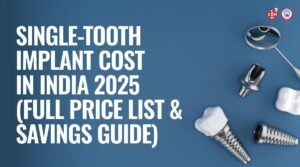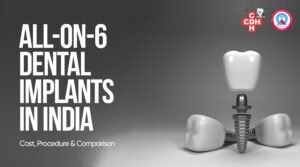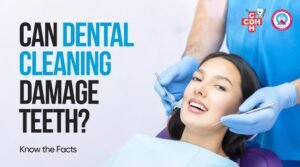Do you want to go to a professional dentist for teeth cleaning? Do you want to maintain healthy oral hygiene and regain your contagious smile? If yes, then this blog is all you need!
In this blog, we will explore the types of teeth cleaning and the process. We will also look into who needs teeth cleaning and who is not eligible for it. But before that, let us understand the basics of teeth cleaning.
What is Teeth Cleaning?
Teeth cleaning removes stains, plaque, and tartar to ensure a clean and healthy smile. It is known as dental prophylaxis and is a key aspect of maintaining oral healthcare. Though regular brushing, flossing, and mouthwashing are indispensable at home, professional teeth cleaning by a dentist delivers thorough cleaning results.
The main objective of teeth cleaning is to avoid dental issues like bad bread, cavities, and gum disease. Due to incorrect brushing and flossing techniques, bacteria accumulate on the teeth that form plaque, a sticky-like substance. This plague, when it gets harder, turns into tartar. Plague and tartar result in tooth decay if not removed on time.
Though teeth cleaning is painless, some people may experience mild sensitivity and discomfort, particularly with gum disease or sensitive teeth. If you feel any discomfort or sensitivity during the dental cleaning procedure, it is crucial to communicate with the dentist to make necessary adjustments to ensure comfort.
Types of Teeth Cleaning
Distinct teeth cleaning procedures cater to distinct dental needs. The type of teeth cleaning required also depends on several factors, like tartar buildup, the severity of plaque, and the presence of any dental issues. The common types are:
Routine Dental Cleaning: Routine dental cleaning is the most common type of teeth cleaning. It is also known as prophylaxis. It is part of a regular dental checkup and is usually performed every six months. In routine dental cleaning, specialized instruments like curettes and scalers remove plaque and tartar from the tooth surfaces. Additionally, it polishes the teeth to ensure stain-free and smooth teeth.
Deep Cleaning: Deep cleaning is an extensive dental procedure often recommended for gum disease patients. It is also referred to as root planning and scaling. In a deep cleaning, the dentist removes the plaque and tartar from the tooth surfaces and the gum lines. He will also clean the roots of the teeth to ensure a bacteria-free and smooth surface to ensure gum tissue healing.
Air Abrasion Cleaning: Air Abrasion Cleaning involves utilizing tiny particles and streams of air to pull out the plague and the tartar. It is a less invasive treatment than the other conventional scaling methods. This method is recommended for people with minimal plaque and tartar or who feel sensitive to conventional scaling instruments.
Laser Cleaning: Laser Cleaning is a sophisticated technique used for teeth cleaning. It uses laser technology to remove bacteria, plaque, and tartar from the teeth and gum. Laser Cleaning delivers a thorough cleaning by vaporizing unwanted deposits. This method is minimally invasive and precise and most often reduces swelling and bleeding compared to the conventional methods.
Ultrasonic Cleaning: In Ultrasonic Cleaning, high-frequency sound waves are used to clean the teeth and the gums. A vibrating top with a water spray assists in getting rid of plaque and tartar from the teeth. This cleaning method is efficient when removing buildup from hard-to-reach areas. It is generally recommended for those who want a comfortable and faster cleaning or people with significant tartar buildup.
What is the Tooth Cleaning Process?
Teeth cleaning is important to maintaining healthy oral hygiene and dental health. Here is a guide to the dentist teeth cleaning process:
Examination and Assessment
The primary step in the teeth cleaning procedure is the examination of teeth, gum, and mouth. The dentist will examine the oral health of the gum, teeth, and surrounding tissues. They may also suggest dental X-rays to pinpoint any latent areas of concern or even dental issues.
Removing Plaque and Tartar
After the examination and assessment, the dentist will continue to remove the plaque, tartar, and stains from the teeth and the gum. The dentist uses advanced dental instruments like curettes and scalers to remove the plaque and tartar from the teeth and the gum. They also pay special attention to the gum line and the areas between the teeth where buildup is usually found.
Scaling
Scaling is a crucial part of the dental cleaning procedure. In scaling, the dentist removes the bacteria, plaque, and tartar below the gumline. The dentist generally uses dental equipment to scrap away the deposit. This process sometimes times causes sensations and scraping sounds though it is painless. The primary objective of scaling is to remove the accumulated bacteria, prevent further tooth damage, and reduce the chances of inflammation.
Ultrasonic Cleaning
The dentist may also use ultrasonic cleaning in addition to manual scaling. This instrument effuses water spray and high-frequency vibrations to remove the stubborn plaque and tartar buildup in the mouth. These vibrations bring down the deposits, and the water clears away the debris. Ultrasonic cleaning is especially helpful when cleaning is required in hard-to-reach areas facilitating thorough cleanliness of the teeth.
Polishing
Once the scaling is done, the teeth are then polished to pull out stains from the teeth, making them smooth and shiny. The dentist will use a rotary brush and then apply prophylaxis, a gritty toothpaste-like substance, to polish the teeth. Polishing enhances the teeth’ appearance and results in a smoother surface resistant to plague formation.
Flossing
Flossing is a part of teeth cleaning where the dentist flosses to clean the bacteria and plaque between the teeth. Flossing is performed to ensure that all the parts of the teeth are thoroughly cleansed.
Fluoride Treatment
Fluoride treatment can be added to the teeth-cleaning process in certain cases. Fluoride strengthens the teeth’ enamel against any possible tooth decay. The dentist applies a fluoride gel, varnish, or foam and leaves it on the teeth for a few minutes. This gel ensures the teeth absorb the fluoride deeply, protecting them against cavities.
It must be noted that certain steps and techniques used in the dental cleaning process vary with the individual needs and the dental protocols. To provide customized care, the dentist may modify the process to address specific conditions and concerns.
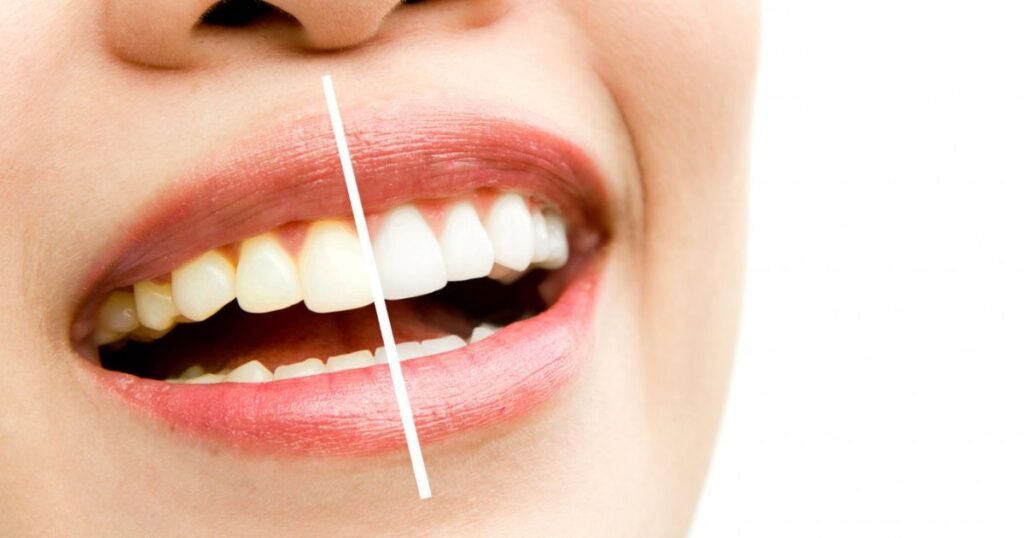
Who Needs Teeth Cleaning?
Teeth cleaning is crucial to ensuring good oral health and is performed for thorough cleaning to avoid any dental issues. Here’s who needs dental cleaning:
Everyone: Since teeth cleaning is a fundamental part of oral health, everyone can benefit from it. Irrespective of oral health status and age, professional teeth cleaning removes stains, plaque, and tartar while promoting better oral hygiene.
Individuals with Plaque and Tartar Buildup: Plague is a sticky substance that, if not cleaned properly, turns into tartar and calculus and continues to cause bad breath, tooth decay, and gum disease. People with plaque and tartar buildup must visit the dentist to get the benefit of dental cleaning to remove these deposits.
People with Gum Disease: Gum disease is usually characterized by inflammation in the gum. Poor oral hygiene usually causes gum disease, so managing and treating this condition is important. Deep cleaning with root planing and scaling is recommended for people with gum diseases to clean the teeth and promote gum healing.
People with Dental Restorations: People with dental restorations may give it a go for dental cleaning. Plague and tartar usually build up in the restorations and result in gum disease and tooth decay. Teeth cleaning ensures that the teeth are thoroughly cleaned and reduces the risk of complications.
People With Medical Conditions: Medical conditions like weakened immune system, diabetes, and heart attack elevate the risk of dental problems. These people are more prone to gum diseases, oral infections, and tooth decay. Teeth cleaning, particularly for people with medical conditions, reduce possible complications and ensures overall health.
Smokers and Tobacco Users: Smoking and tobacco can deleteriously impact oral health and hygiene. They most commonly stain teeth and increase the chance of gum disease by contributing to plaque and tartar buildup. Professional teeth cleaning is indispensable for smokers and tobacco users to minimize bacterial accumulation.
Who is Not Eligible for Teeth Cleaning?
Though teeth cleaning is beneficial for most individuals, for some, it is not. Some individuals may not be eligible for teeth cleaning due to certain medical conditions. Here are people who are not eligible for dental cleaning:
Active Oral Infections: If one has an active oral infection like an oral herpes outbreak or abscess, he may delay the teeth cleaning procedure until the infection has been resolved. If teeth cleaning is performed with an active oral infection, it can spread the infection to the other areas of the mouth and comprise the healing process. It is important to consult the dentist in such situations before proceeding with the teeth cleaning.
Recent Oral Surgery or Dental Procedures: People who have recently undergone oral or dental procedures must postpone the teeth cleaning procedure. It is important because it allows tissues to recover and lower the risk of complications. The dentist will first examine the healing progress and then set a schedule for teeth cleaning.
Pregnant Women: Though pregnant women are eligible for teeth cleaning, special considerations are important to any potential effect of hormonal changes caused by teeth cleaning. Therefore, it is crucial to inform the dentist about the pregnancy. It is also likely that some pregnant women may need additional precautions to ensure the safety of the mother and the child.
People with Certain Medical Conditions: Certain medical conditions may require additional modifications and precautions during teeth cleaning. People with bleeding disorders need special attention to reduce the risk of unrestrained bleeding. Therefore, informing the dentist about such conditions is important to ensure proper care.
Individuals with Advanced Periodontal Disease: In the case of advanced periodontal disease, teeth cleaning alone is insufficient. Deep cleaning procedures like root planing and scaling are important to treat the gum effectively. The dentist will inspect the acuteness of such disease to create the best treatment plan.
Are Teeth Cleaning Safe?
Dentist teeth cleaning is usually a safe procedure that a professional dentist performs. It is generally recommended to ensure good oral health, but certain factors must be considered to ensure safety. Here are a few of the safety aspects of teeth cleaning that must be considered:
Professional Expertise
A professional dentist or dental hygienist must administer teeth cleaning. Since these professionals have received extensive education and training, they perform the procedure safely and effectively. Their expertise assures that teeth cleaning is directed and conducted using appropriate tools and techniques and adhering to infection control protocols.
Individualized Assessment
Before the teeth cleaning procedure, the dentist assesses the individual’s medical history and oral health. This assessment is crucial to understand potential risks that may affect the teeth cleaning procedure. Factors like previous dental treatment, tooth sensitivity, gum disease, and other underlying medical conditions are considered to ensure the teeth cleaning meets the individual’s needs.
Infection Control
Dentists must adhere to strict infection control measures to ensure safe and clean patient procedures. Instruments used in the cleaning procedure must either be disposed of or thoroughly sterilized after every use to avoid transmission of diseases. The dentist also uses appropriate protective equipment like masks and gloves to reduce the risk of contamination.
Potential Discomfort
During the teeth cleaning, some individuals may feel sensitivity or experience mild discomfort if they have gum disease or sensitive teeth. Therefore, the dentist takes measures to ensure the individual’s comfort. These measures usually involve adjusting the pressure during scaling or using a numbing agent.
Rare Complications
People with rare and potential complications must be careful while going for teeth cleaning. Complications like tooth sensitivity, gum irritation, and gum bleeding can resolve independently within a few days. In rare cases, people with medical conditions like compromised immune systems or infective endocarditis may need antibiotic prophylaxis to avoid the risk of infection.
What is the Teeth Cleaning Cost?
The teeth cleaning cost in India depends on various factors like location, the complexity of cleaning, dental practice, and additional treatment that is performed during the procedure. The average teeth cleaning price is INR 1,500 (approximately USD 18) for a standard cleaning procedure that removes plaque and tartar.
This cost will likely increase if any procedure or treatment is necessary for fluoride treatment or gum disease. Since, in some cases, dental insurance may cover some of the teeth cleaning‘s costs, checking it before going for the procedure is recommended.
Additionally, one must consult the dentist for the exact teeth cleaning price. The dentist could provide the exact dental cleaning price based on the individual’s preferences and the additional services required.
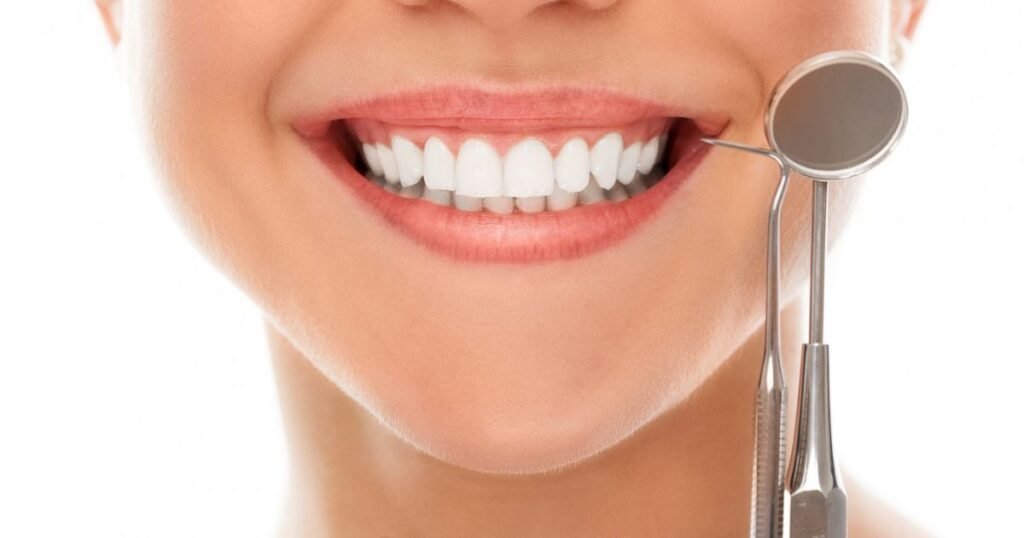
Why is CDH Your Best Choice for Teeth Cleaning Procedures?
City Dental Hospital is one of the best dental implant clinics in India. We prioritize offering top-notch treatment by adhering to the protocols and providing the best treatment for dental implants, full mouth rehabilitation, teeth whitening, invisible aligners, smile makeovers, crowns and bridges, and many more.
We have been awarded the Best Dental Hospital in India and have treated 24,000+ patients. We care for you and your smile and help you ensure good oral health. With City Dental Hospital, take the first step towards a healthy smile!




